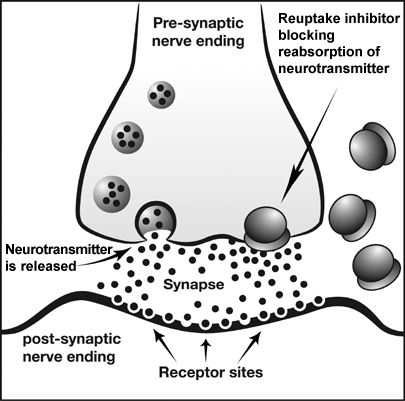Hyperforin Mechanism of Action
Hyperforin Mechanism of Action
Hyperforin is not a drug, but a natural compound extracted from the St. John’s wort (Hypericum perforatum) plant. Researchers have discovered in the past few years that hyperforin is the primary active constituent responsible for the antidepressant effect of St. John’s Wort.1
Hyperforin works similarly to prescription antidepressants by blocking the reuptake of the neurotransmitters norepinephrine, serotonin, and dopamine.2 These three chemicals are naturally found in the brain and help to regulate mood and emotions. They are called “neurotransmitters,” because they are chemical messengers that transmit information between nerve cells, or neurons, in the brain. An imbalance of serotonin, norepinephrine, and/or dopamine may cause depression, anxiety or fatigue. By reducing the activity of reuptake transporters, hyperforin increases the levels of these neurotransmitters in the brain, which may improve mood and restore emotional balance.3,4 Hyperforin also inhibits the reuptake of GABA, a neurotransmitter that increases relaxation and reduces anxiety.
As a natural reuptake inhibitor, hyperforin is effective for treating many conditions (such as depression and anxiety) that are treated with reuptake inhibitor drugs. (Drugs such as Prozac and Paxil are called SSRIs, for selective serotonin reuptake inhibitors.)
Unlike reuptake inhibitor drugs (including SSRI antidepressants), hyperforin is a non-competitive reuptake inhibitor. This means hyperforin does not actually bind to and block the reuptake transporters. Rather, it affects the pre-synaptic sodium channels that control reuptake transporter activity. This novel mechanism may explain why St. John’s Wort does not cause many of the side effects associated with prescription SSRI drugs.

2 Laakmann G, Jahn G, Schule C. Hypericum perforatum extract in treatment of mild to moderate depression. Clinical and pharmacological aspects. Nervenarzt 2002 Jul;73(7):600-12.
3 Teufel-Mayer R, Gleitz J. Effects of long-term administration of hypericum extracts on the affinity and density of the central serotonergic 5-HT1 A and 5-HT2 A receptors. Pharmacopsychiatry 1997 Sep;30 Suppl 2:113-6.
4 Calapai G, Crupi A, Firenzuoli F, et al. Effects of Hypericum perforatum on levels of 5-hydroxytryptamine, noradrenaline and dopamine in the cortex, diencephalon and brainstem of the rat. J Pharm Pharmacol 1999 Jun;51(6):723-8.
